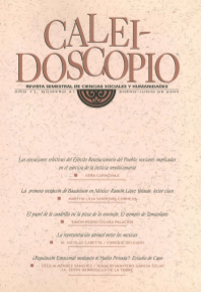Formative socialization processes of academic staff in Mexico
DOI:
https://doi.org/10.33064/22crscsh381Keywords:
socialization, analysis, sample, faculty, institutions, mobility, graduates, bachelor's degree, academic trajectory, institutionalAbstract
This study identifies relevant aspects of the formative socialization of academics in Mexico, assessing the extent to which it enables them to perform as such. Rest in two sources of information. First, the secondary analysis of a database built on a representative national sample of teachers, which included 3,861 teachers from 65 different institutions of higher education IES. Second, the accomplishment of 34 interviews to academic personnel of 8 different institutions. The results indicate that a high proportion of the teaching staff shows little geographic and interinstitutional mobility, which is associated with the tendency of HEIs to hire their own graduates. It was found that the socialization during the degree has been the most significant influence to start academic career, although it tended to be individual, informal and non-sequential, about 60% of teachers start their academic career immediately after finishing their degree . However, 57% of teachers increased their educational level (school mobility), once they were incorporated into academic life. Nearly 50% of the professors who initiated studies on the impact of international trends and national policies at the federal and institutional level, aimed at HEI staff.Downloads
Downloads
Published
How to Cite
Issue
Section
License
Licencia Creative Commons Atribución-NoComercial-CompartirIgual 4.0 Internacional
El lector es libre de compartir o adaptar el material en cualquier medio o formato bajo las condiciones siguientes: (a) debe reconocer adecuadamente la autoría, proporcionar un enlace a la licencia e indicar si se han realizado cambios; (b) no puede utilizar el material para una finalidad comercial y (c) si remezcla, transforma o crea a partir del material, deberá difundir sus contribuciones bajo la misma licencia que el original.
Resumen de la licencia
https://creativecommons.org/licenses/by-nc-sa/4.0/deed.es_ES
Texto completo de la licencia
https://creativecommons.org/licenses/by-nc-sa/4.0/legalcode
Cada autor es responsable del contenido de su artículo. En el caso de un texto colectivo, el primer autor asume la responsabilidad intelectual de los resultados del proceso editorial; los autores son responsables de obtener la licencia de autor para reproducir materiales gráficos o fotográficos que pertenecen a terceros.
Los autores asumen plena responsabilidad en el caso de falsificación de datos o falta de autenticidad en la investigación. Se comprometen, también, a no reutilizar trabajos ya publicados, total o parcialmente, para presentarlos en otra publicación.
Estas condiciones aplican tanto a la versión impresa como a la versión electrónica de la revista.


















